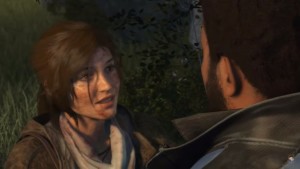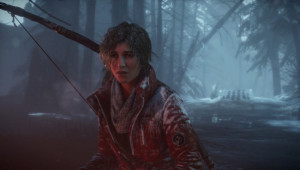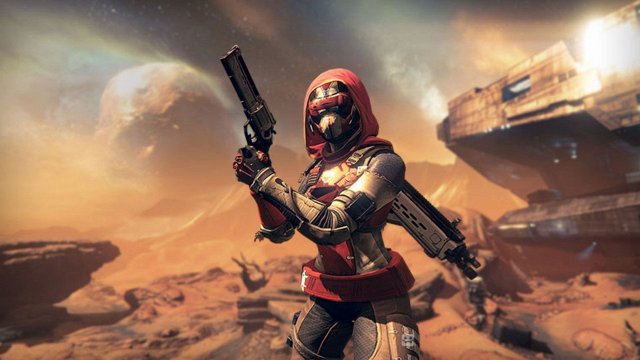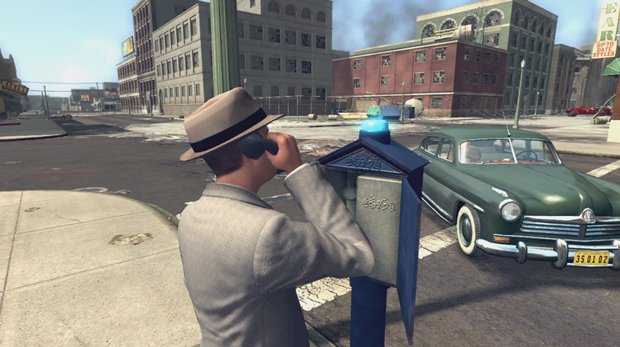Last week, I wrote about patriarchal constructions of fatherhood and daughterhood in The Last of Us, and I want to continue in that vein this week as well. To extend this line of thinking, I want to examine how it is such constructions come to be repeated across gaming narratives. And I think that taking a (spoiler-laden) look at the representations of fatherhood and daughterhood in Rise of the Tomb Raider, specifically, is a good place for us to pick up where we left off.
 Rise of the Tomb Raider contains similarly problematic representations of fatherhood and daughterhood. In the game, Lara embarks on journeys to Syria and Siberia on a quest for the key to immortality—a quest motivated by her deceased father. Indeed, Alexa Ray Corriea explains, “Lara’s father was chasing a myth, or so people thought, and in life it seems that Lara didn’t support his obsession. But now, with Lord Croft gone and her appetite for adventure on the rise, Lara feels compelled to finish the family work.” Corriea also explains that Lara is motivated to embark on these adventures by “her need to honor her father and make peace for her distance from him by completing what he started.” As a result, the connection between Lara and her father has been constructed as a vital means of framing the action of the game and the manner in which we play it.
Rise of the Tomb Raider contains similarly problematic representations of fatherhood and daughterhood. In the game, Lara embarks on journeys to Syria and Siberia on a quest for the key to immortality—a quest motivated by her deceased father. Indeed, Alexa Ray Corriea explains, “Lara’s father was chasing a myth, or so people thought, and in life it seems that Lara didn’t support his obsession. But now, with Lord Croft gone and her appetite for adventure on the rise, Lara feels compelled to finish the family work.” Corriea also explains that Lara is motivated to embark on these adventures by “her need to honor her father and make peace for her distance from him by completing what he started.” As a result, the connection between Lara and her father has been constructed as a vital means of framing the action of the game and the manner in which we play it.
Lara’s father, (referred to as Lord Croft throughout the game, a title that brings to mind Adrienne Rich’s conception of the “Kingdom of the Fathers”) is figured as central to the game’s narrative from the very beginning, for Lord Croft’s voice is the first thing we hear in a voiceover that occurs over scenes of snowy Siberian landscapes: “What makes someone reach beyond the boundaries of human experience—to face the unknown? As children, we question the world around us. We learn, we accept, and gradually, we lose our capacity for wonder. But some do not. The explorers, the seekers of truth. It is these pioneers who define the future of mankind.” Lara Croft, of course, is just such a pioneer (for her face is the first one we see after Lord Croft’s voiceover), but her pioneering nature is framed as being the result of the influence of her father, for the game features several flashbacks to Lara’s memories of her childhood, memories that reveal that Lara’s quest in the game—a quest for the key to immortality called the Divine Source—is a continuation of one her father started but, ultimately, never completed due to the fact that he died (the result of a seeming suicide, although we later come to find out that he was actually killed by an evil cult called Trinity that also quests for eternal life). In one of these memories, Lord Croft tells a young Lara, “I’m close Lara…Close to something important. Someday…you’ll understand.” And in another, he tells her, “Lara, listen to me. Someday you’re going to make such a mark on this world. You’re going to make me so proud.” These ideas of someday understanding what Lord Croft is close to and someday making him proud become conflated in the game, for Lara’s quest to find the Divine Source, her quest to continue her father’s work, is motivated both by her desire to understand and her desire to make him proud.
 Indeed, this idea of making him proud is something that is reiterated throughout the game; in the first scene in Siberia, Lara’s friend Jonah tells her, “Hey, even if we don’t find anything up here, your dad would be proud.” And later on in the game, when Lara tells Jonah, “I was right, Jonah. Dad was right. The Divine Source is real. I wish he was here to see this,” Jonah again says (and not for the last time), “He’d be proud of you.” And what this specific exchange reveals is that not only does Lara embark on this quest in order to make her father proud, but she also does so to prove him right; by proving him right, she is proving herself and her faith in her father’s work (and his influence over her own work) right as well. This desire to prove her father and herself right (for the two are inexorably linked) causes Lara to assert when told that this quest “is not [her] burden,” “Of course it is! My father died for this.” Thus, Lara sees her quest for the Divine Source as her daughterly duty, her “burden,” because she believes it is her burden as Lord Croft’s daughter to “make them see that you were right all along. That you sought the truth. Not fairytales. I’ll make it right, Dad. I promise.”
Indeed, this idea of making him proud is something that is reiterated throughout the game; in the first scene in Siberia, Lara’s friend Jonah tells her, “Hey, even if we don’t find anything up here, your dad would be proud.” And later on in the game, when Lara tells Jonah, “I was right, Jonah. Dad was right. The Divine Source is real. I wish he was here to see this,” Jonah again says (and not for the last time), “He’d be proud of you.” And what this specific exchange reveals is that not only does Lara embark on this quest in order to make her father proud, but she also does so to prove him right; by proving him right, she is proving herself and her faith in her father’s work (and his influence over her own work) right as well. This desire to prove her father and herself right (for the two are inexorably linked) causes Lara to assert when told that this quest “is not [her] burden,” “Of course it is! My father died for this.” Thus, Lara sees her quest for the Divine Source as her daughterly duty, her “burden,” because she believes it is her burden as Lord Croft’s daughter to “make them see that you were right all along. That you sought the truth. Not fairytales. I’ll make it right, Dad. I promise.”
In this way, Lara Croft’s quest for immortality and her quest to legitimize her father’s work are one and the same. The intersection, then, of Lara’s role as a daughter and her role as a seeker of immortality seem to speak to the manner in which a child’s life is often conceived of as being an extension of the parent’s, as evidenced by another voiceover by Lord Croft:
It is the greatest cruelty of life that we are all too swiftly taken from it. We age, we decay, we die…but what do we leave behind? Bones? Dust? What of the soul? Does it endure beyond our earthly existence? I believe it does. A truth lies at the heart of many myths and stories—a truth not of science, but something more profound. The key to unlocking everlasting life. I may have found the next piece to the puzzle.
What Lord Croft has left behind is his daughter, and it is this extension of the Croft legacy that seems to be the game’s conception of the “key to unlocking everlasting life.” Lara’s carrying on of this legacy, her relegitimization of the Croft name, is conceived of as being the manner in which Lara will make her father proud, the manner in which she will make her mark on the world, for as Lord Croft says to Lara at the end of the game in a voice recording he has left her, “My dearest Lara, I often think about how my father would turn over in his grave if he knew the shame I had brought upon our family’s name. Croft—what does it even mean? I just hope you can make your own mark on this world someday. Remember that the extraordinary is in what we do, not who we are.” After listening to this recording, Lara reflects,
I had listened to his last tape a thousand times, but it’s as if I was hearing my father’s words only now, for the first time. It doesn’t matter what choices he would have made…I have to make my own…There are secrets out there that can change the world. I need to find them. Not for my father, not for anyone else…I can make a difference. I can make the right difference.
 Thus, for Lara the “what we do” is a matter of making “the right difference,” which she comes to articulate as a matter of making her own choices. However, such choices continue to be framed as being the result of her father’s guidance, guidance that reminds her that “the extraordinary is in what we do, not who we are.” Thus, both what Lara does and who she is are framed through her role as a daughter. Such framing reveals the representational power of the father—the power the father has over the ways women-as-daughters are constructed and framed in games like Rise of the Tomb Raider.
Thus, for Lara the “what we do” is a matter of making “the right difference,” which she comes to articulate as a matter of making her own choices. However, such choices continue to be framed as being the result of her father’s guidance, guidance that reminds her that “the extraordinary is in what we do, not who we are.” Thus, both what Lara does and who she is are framed through her role as a daughter. Such framing reveals the representational power of the father—the power the father has over the ways women-as-daughters are constructed and framed in games like Rise of the Tomb Raider.
This idea of power and control is one that Adrienne Rich highlights as a defining characteristic of patriarchy. In short, the patriarchal power over others pervades both Rise of the Tomb Raider, in which Lara Croft (whose motivation throughout the game is controlled by the memory of her father) insures the safe passage of Lord Croft’s soul after death, and—to connect all this back to my post last week—The Last of Us, in which Joel consistently asserts his power over Ellie by making decisions for her. And even when Lara and Ellie do assert their power in these games, their modes of doing so are mainly implemented through the use of force—force that is often wielded in service of the father. In other words, Lara and Ellie exert their power through the use of force, whether such force is used in the killing zombies or the killing of the soldiers of Trinity. And just as often, such force is used in the service of the father, for Ellie often only makes use of force to save Joel (even though he usually does not want her to do so) and Lara makes use of force in order to continue her father’s legacy and finish the quest for immortality that he began. Such force, then, even when wielded by the daughter, continues to be a source of patriarchal power, for it is wielded in service of the father.
While I’m interested in the linkages between the patriarchal configurations of fatherhood and daughterhood in these two games, I think it’s also important to consider how it is these configurations function differently in Rise of the Tomb Raider and The Last of Us, especially when thinking about how it is we engage with Ellie and Lara. Such a consideration is going to be the focus of my next post (so stay tuned!) because it is my hope that such a consideration will allow for a deeper understanding of how it is manifestations of the patriarchal power of the father impact the ways we interact and engage with gaming narratives.




